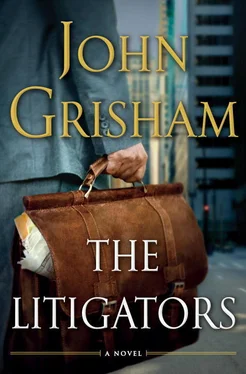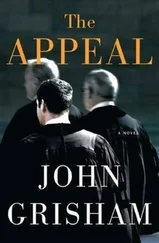Lurch stepped closer too and said, “Helen, this has happened before around here. In fact, it’s not that unusual. He’ll be fine tomorrow.”
“And the firm has a counselor on the payroll, a real pro who deals with casualties,” Al added.
“A casualty?” Helen asked. “Is that what my husband is at this point?”
Lurch shrugged and said, “Yes, but he’ll be okay.”
Al shrugged and said, “He’s in a bar. I’d love to be with him.”
At Abner’s, the lunch crowd had finally arrived. The booths and tables were full, and the bar was packed with office workers washing down burgers with pints of beer. David had moved one stool to his right so that he was now next to Miss Spence. She was on her third and last Pearl Harbor. David was on his second. When she offered him his first, he had initially declined, claiming he had no taste for fussy mixed drinks. She insisted, and Abner whipped one up and slid it in front of David. Though it looked as harmless as cough syrup, the drink was a lethal combination of vodka, melon liqueur, and pineapple juice.
They found common ground at Wrigley Field. Miss Spence’s father had taken her there as a small girl, and she had followed her beloved Cubs her entire life. She had held season tickets for sixty-two years, a record, she was certain, and she had seen the great ones — Rogers Hornsby, Ernie Banks, Ron Santo, Billy Williams, Fergie Jenkins, and Ryne Sandberg. And she had suffered greatly, along with all Cubs fans. Her eyes danced as she told the well-known story of the Curse of the Billy Goat. Her eyes moistened when she remembered, in detail, the Great Fall of 1969. She took a long sip after recounting the infamous June Swoon of 1977. She let it slip that her late husband had once tried to buy the team but was somehow outmaneuvered.
After two Pearl Harbors, she was fairly smashed. The third was putting her away. She had no curiosity about David’s situation; rather, she preferred to do most of the talking, and David, who was in slow motion, was content to just sit and listen. Abner ventured by occasionally, making sure she was happy.
At precisely 12:15, just as Abner’s lunch business hit full stride, her Asian driver arrived to collect her. She drained her glass, said good-bye to Abner, made no effort to pay a tab, thanked David for the company, and left the bar, her left hand tucked inside her driver’s elbow and her right hand working the cane. Her walk was slow, but erect, proud. She’d be back.
“Who was that?” David asked Abner when he got close enough.
“I’ll tell you later. You having lunch?”
“Sure. Those burgers look good. Double cheese, with fries.”
“You got it.”
The cabdriver’s name was Bowie, and he was a talker. As they left the third funeral home, his curiosity could no longer be restrained. “Say, pal, I gotta ask,” he chirped over his shoulder. “What’s with all these funeral homes?”
Wally had covered the rear seat in obituary pages, city maps, and legal pads. “Let’s head over to Wood & Ferguson on 103rd Street near Beverly Park,” he said, temporarily ignoring Bowie’s question. They had been together for almost two hours, and the meter was approaching $180, a nice chunk in terms of cab fare but chump change in the context of Krayoxx litigation. According to some of the news articles Lyle Marino had given him, the lawyers were speculating that a wrongful death case involving the drug could potentially be worth $2 to $4 million. The lawyers would take 40 percent, and Finley & Figg would, of course, have to share their fee with Zell & Potter or another tort firm spearheading the litigation. Still, after all the fee splitting, the drug was a gold mine. The urgent issue was finding the cases. As they rushed around Chicago, Wally was confident he was the only lawyer out of a million in the city who was, at that moment, shrewd enough to be combing the streets in search of Krayoxx victims.
According to another article, the drug’s dangers had just been discovered. And another one, quoting a trial lawyer, said that the medical community and the public in general were not yet aware of the “Krayoxx fiasco.” But Wally was now aware, and he didn’t care how much he spent on cab fare.
“I was asking about all these funeral homes,” Bowie chirped again. He was not going away, and he would not be ignored.
“It’s one o’clock,” Wally announced. “You had lunch?”
“Lunch? I’ve been with you for the past two hours. You seen me eat lunch?”
“I’m hungry. There’s a Taco Bell up there on the right. Let’s use the drive-thru.”
“You’re paying, right?”
“Right.”
“I love Taco Bell.”
Bowie ordered soft tacos for himself and a burrito supreme for his passenger. As they waited in line, Bowie said, “So I keep thinking, ‘What’s this guy doing at all these funeral homes?’ you know? None of my business, but I’ve been driving for eighteen years, and I’ve never had a ride who popped in on funeral homes all over town. Never had a ride who had that many friends, know what I mean?”
“You’re right about one thing,” Wally said, looking up from even more of Lyle’s research. “It’s none of your business.”
“Wow. Zinged me on that one, didn’t you? Pegged you for a nice guy.”
“I’m a lawyer.”
“From bad to worse. Just kidding, you know, my uncle’s a lawyer. Jerk.”
Wally handed him a $20 bill. Bowie took the sack of food and distributed it. Back on the street, he crammed a taco into his mouth and stopped talking.
Rochelle was secretly reading a romance novel when she heard footsteps on the front porch. She deftly stuffed the paperback into a drawer and moved her fingertips to the keyboard so she seemed to be hard at work when the door opened. A man and a woman entered timidly, their eyes darting around, almost in fear. This was not unusual. Rochelle had seen a thousand come and go, and they almost always entered with grim and suspecting faces. And why not? They wouldn’t be there if they were not in trouble, and for most it was their first visit to a law office.
“Good afternoon,” she said professionally.
“We’re looking for a lawyer,” the man said.
“Divorce lawyer,” the woman corrected. It was immediately obvious to Rochelle that she had been correcting him for some time, and he was probably fed up. They were in their sixties, though, a bit too old for a divorce.
Rochelle managed a smile and said, “Please have a seat.” She pointed to two nearby chairs. “I’ll need to take down some basic information.”
“Can we see a lawyer without an appointment?” the man asked.
“I think so,” Rochelle said. They backed into the chairs and sat down, then both managed to scoot the chairs farther away from each other. This could get ugly, Rochelle thought. She pulled out a questionnaire and found a pen. “Your names, please. Full names.”
“Calvin A. Flander,” he said, beating her to the punch.
“Barbara Marie Scarbro Flander,” she said. “Scarbro’s the maiden name, and I might take it up again, haven’t decided yet, but everything else has been worked out, and we’ve even signed a property settlement agreement, one I found online, and it’s all right here.” She was holding a large sealed envelope.
“She just asked for your name,” Mr. Flander said.
“I got that.”
“Can she take her old name back? I mean, you know, it’s been forty-two years since she’s used it, and I keep telling her that no one will know who she is if she starts going by Scarbro again.”
“It’s a helluva lot better than Flander,” Barbara shot back. “Flander sounds like someplace in Europe or somebody who sleeps around — fi-lander or fi-lander-er. Don’t you think so?”
Читать дальше












